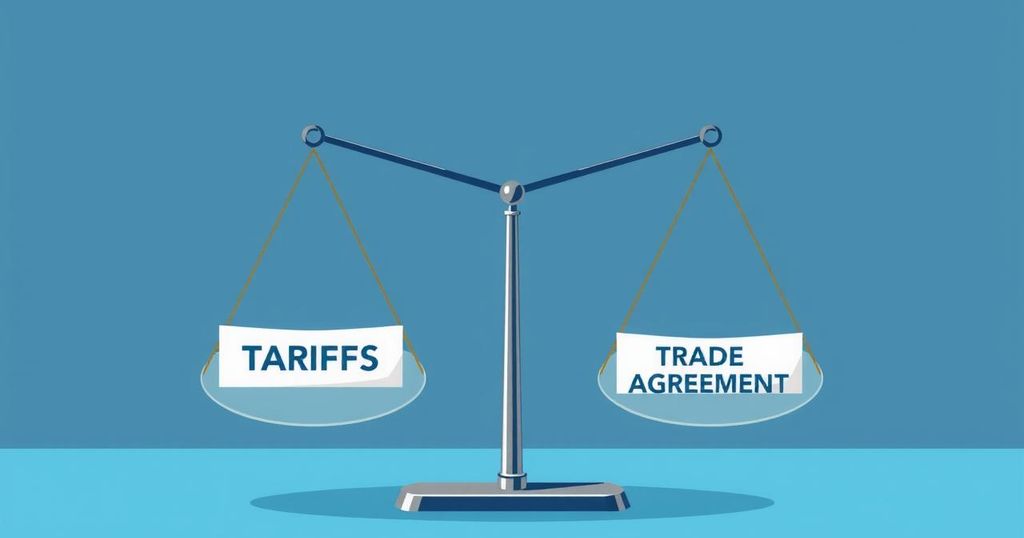US Court Blocks Trump’s ‘Liberation Day’ Tariffs, Calls Authority into Question

The US Court of International Trade halted Trump’s “Liberation Day” tariffs, ruling he exceeded his authority under emergency powers. The decision threatens Trump’s trade policy and draws criticism from the White House about judicial overreach. The ruling follows lawsuits from affected businesses and states, arguing tariffs cause damage and increased costs. Meanwhile, the administration has begun to soften its tariff measures in response to pressure and ongoing international negotiations.
On Wednesday, the US Court of International Trade made a striking decision that significantly impacts President Trump’s “Liberation Day” tariffs. This ruling, deemed a setback for Trump’s ambitions, declared that his use of emergency powers to implement a broad array of tariffs was overreaching. Essentially, the court determined that the White House acted outside of its legal boundaries.
Judges pointed out that Trump’s Worldwide and Retaliatory Tariff Orders went beyond any authority given to the President to control importation through tariffs. This court action effectively blocks one of Trump’s most far-reaching economic strategies, creating uncertainty regarding his approach to trade, framed as a measure to address “unfair practices” and bolster domestic manufacturing.
In response to the ruling, the White House condemned it as an illustration of judicial overreach. A spokesperson for the administration argued that such decisions should not rest with “unelected judges” and emphasized Trump’s commitment to leveraging executive powers to confront perceived national emergencies to restore what they call American greatness.
The ruling emerged from two lawsuits filed earlier in May. One case was led by VOS Selections, a wine importer, alongside four other American businesses, which argued they directly suffered due to these tariffs. Another lawsuit involved twelve states, spearheaded by Oregon, which claimed that increased tariffs would raise costs for essential goods purchased by public entities.
During the court proceedings, the government’s lawyers contended that Trump’s tariff policies had sparked international negotiations. They warned any legal injunction could seriously harm the United States’ leverage internationally. Justice Department attorney Brett Shumate asserted, “An injunction would completely kneecap the president.” Yet, Judge Jane Restani countered, indicating the necessity for the court to uphold statutory authority over political considerations.
The IEEPA, cited by the administration to justify its actions, implies the President can impose tariffs during a national emergency. The administration’s legal argument was founded on the premise that unfair foreign trade practices posed a significant threat to national security and the economy. The White House reiterated this viewpoint, pointing to historical trade deficits that have negatively impacted American communities and defense industries.
Nevertheless, the court remonstrated that without congressional consent, the President cannot initiate tariffs through the emergency statute. “This is an unprecedented and unlawful expansion of executive authority,” commented Jeffrey Schwab, representing the businesses challenging the tariffs.
Interestingly, in light of recent developments, the White House had started to ease some tariff measures prior to the ruling. President Trump postponed a potential 50 percent tariff on European goods following discussions with European Commission President Ursula von der Leyen. Additionally, the US and China have reached a temporary 90-day agreement to reduce certain tariffs, which notably excludes smartphones and high-tech products.
In summary, the US Court of International Trade’s ruling against Trump’s “Liberation Day” tariffs marks a significant legal hurdle for the President’s economic plans. The court determined that Trump had exceeded his authority under the IEEPA, igniting debates over the executive power’s limits. While the White House plans to challenge this ruling, the unfolding situation underscores the ongoing complexities and tensions in US trade policy, particularly between China and European nations.
Original Source: indianexpress.com







